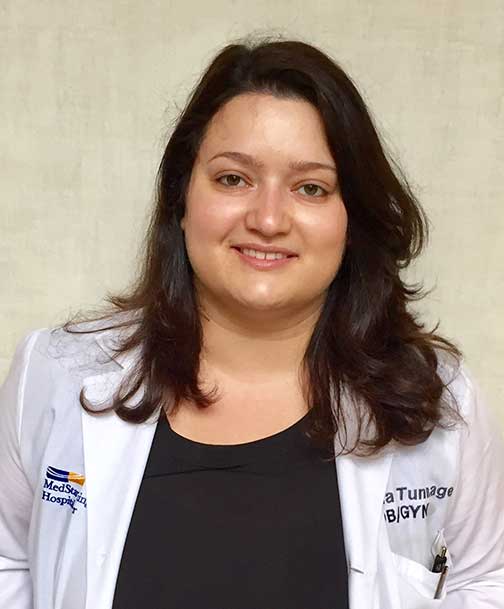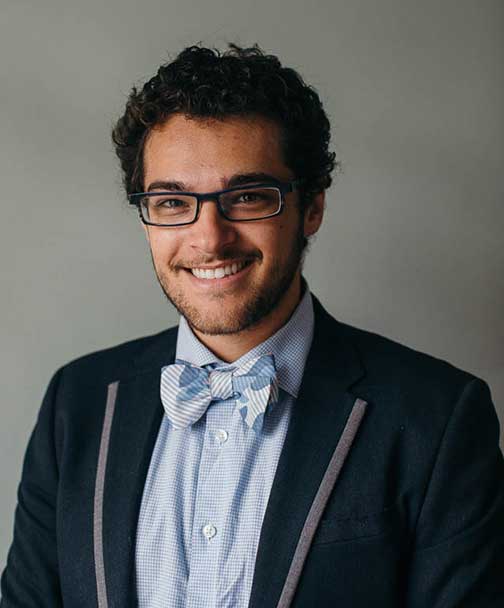From BMB to clinical research—the paths of two BMB master’s alumni
Where do our master’s students go after they leave the Department of Biochemistry and Molecular Biology? We recently caught up with a couple alums who are taking what they learned in the Department of Biochemistry and Molecular Biology in exciting directions.

Irina (Usach) Tunnage, DO, MHS ’11, is currently a resident Ob/Gyn physician—and the Administrative Chief Resident—at the Medstar Washington Hospital Center, and was recently selected for the New York University Gynecologic Oncology Fellowship Program.
Tunnage joined the BMB MHS program because, while she always knew she wanted to go to med school and focus on cancer, she realized that most medical school curriculums didn’t spend much time on either public health or population biology.
The department’s MHS program’s cancer track was a particular draw for her, and she said one of the highlights of the BMB program was "to really be able to dive into the cellular mechanism of cancer."
With topics as complicated as cancer, Tunnage explained, it’s important to be able to sit with the topics and go over them, to digest and reabsorb the information until all the pieces fit. The BMB program classes let her do this and enabled a much deeper understanding of the topics.
Tunnage plans to become a physician scientist, a path she sees as important, given the number of cancers that we don’t yet know how to treat. She says being a physician scientist goes beyond treatment - “it is also pushing the sort of edge of medicine.”
Research isn’t new to Tunnage - after finishing her MHS, she was a Research Coordinator with Johns Hopkins Medical Institute for the Pancreatic Cancer National Tumor Registry and Rapid Autopsy Project.
More recently, she created an app that organizes data about recurrent gynecologic cancers, which she hopes will bridge gaps in access, noting that while people at Johns Hopkins are used to hearing current updates, “if you're in a more rural location, you may have less access to the newest research and cancer treatment trends.”
Her next step will be the NYU Gynecologic Oncology Fellowship, a three-year program that starts with a year of research in the lab, followed by two years of clinical work.

Brent Monseur, MD, ScM '12, is an Ob/Gyn resident physician at Thomas Jefferson University Hospitals, and has received the Reproductive Endocrinology and Infertility Fellowship at Stanford Medicine.
Monseur joined the program with an eye to working in reproductive biology, and the interdisciplinary nature of the department made it an ideal place where he could do reproductive studies while also taking classes across the Johns Hopkins School of Public Health.
Monseur said that he continues to use the knowledge and skills he learned during his ScM. From critical thinking to understanding the connections between research and its translation to health impacts—how studying the really small things can impact populations—“that skill set really comes from the mind of the BMB department," he said.
With his experience with laboratory research in former BMB Professor Janice Evans’ lab during his ScM and his medical training, Monseur’s goal is to run a lab and still be a clinician.
The Reproductive Endocrinology and Infertility Fellowship that he will start in July 2020 is designed to prepare fellows for academic careers with a three-year program with one year focused on clinical work plus 18 months of laboratory research, and with his BMB lab research experience, Monseur expects to be ahead of the learning curve for the laboratory portion of the training.
For students considering a master’s programs, he noted that BMB has great programs, particularly for students interested in science, “and specifically health science and how it applies to populations.”
And his advice for current students?
"Remember you have at your disposal the highest quality public health education available anywhere," Monseur said.
